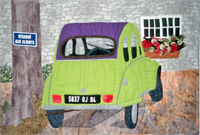 |
Student Supply List for Picture This! (3-5 Day
Class)
Photos:
Several photos you've taken yourself, to avoid copyright issues.
7” x 9” (approx.) color photocopy or inkjet print of each
photo.
7” x 9” (approx.) B&W photocopy or inkjet print of
each photo.
Photos with high contrast and a single major subject will be easier
to work with. It's best to keep it simple for your first effort.
Good subjects are people from the back (we won't be working with
facial features), travel photos, buildings, cars, pets, landscapes,
and flowers (flowers should have multiple shades of color to avoid
the "big blob" look). You may want to look at the student
gallery for more ideas.
Fabric:
Fabrics to represent the various elements in your photo. Feel free
to change colors and textures. Small-scale architectural and nature-themed
fabrics (bricks, stones, skies, bark) can work well. Hand-dyed or
painted fabrics and batiks are good for skies (avoid cartoonish
fabrics with evenly spaced white clouds). Use several shades of
green for foliage.
Fabrics you'd like to try out for special effects such as shadows
or shiny objects, e.g., tulle, organza, lamé.
Fabric scraps to practice machine appliqué techniques.
1-2 yards muslin to use as a base for your appliqué; depending
on your design, you may not need this.
1-2 yards fleece, batting, flannel, or felt for design wall.
Thread:
50-wt. cotton thread to match appliqué pieces.
60-wt. cotton thread to match appliqué pieces (if you can't
find it, just bring the 50-wt. thread).
Invisible thread (clear for light colors, smoke for dark colors).
Sewing Supplies:
Sewing machine with zigzag stitch, in good working order, an open-toed
embroidery foot, and a darning foot if you have one. (Bring your
manual, and don't forget your foot pedal and power cord!)
Needles: For 50-wt. cotton thread, size 80 sharp or denim needle.
For 60-wt. cotton or invisible thread: size 60, 65, or 70 sharp
or denim needle.
White thread and hand sewing needle for basting.
Rotary mat, cutter, and ruler.
Basic sewing supplies (pins, seam ripper, small and large scissors
to cut paper and fabric).
Cuticle stick or “That Purple Thang.”
Pencil and eraser.
Fusible web: Wonder-Under, Steam-A-Seam 2, or other favorite brand
if you'd like to fuse.
Freezer paper.
Glue stick.
Masking tape.
Scotch tape (matte finish, 3/4” wide).
Permanent marking pens, fat and thin (I use Sharpie Fine Point and
Ultra Fine Point).
Light box if you have one (be prepared to share with other students).
Iron and small ironing surface (if not supplied by venue).
Design wall (foam core board covered with batting, felt, or Pellon
fleece), if not supplied by venue.
During class, you will trace your photo onto an acetate sheet (supplied
by the teacher at no charge). You will enlarge the acetate drawing
at a nearby copy center (students usually do this during the lunch
break). To save time, you may wish to bring your own tracing or
line drawing already enlarged to the desired size on plain white
or gridded paper of your choice.
Optional (bring only if you already own):
Clover mini iron.
Teflon pressing sheet to use with fusible web.
A small digital camera can be handy to help audition fabrics.
Recommended book:
Picture This! Appliqué Pictorial Quilts—From Photo
to Fabric, by Marcia Stein
C&T Publishing, September 2010
|

